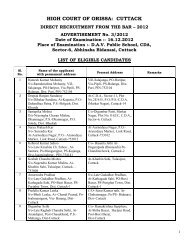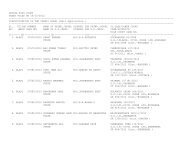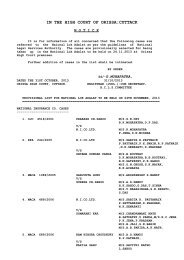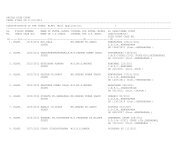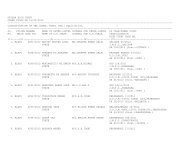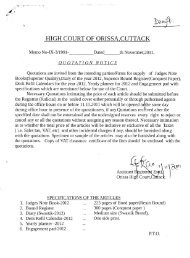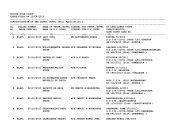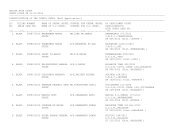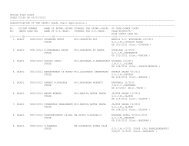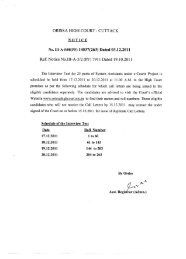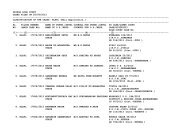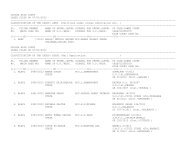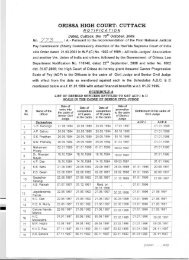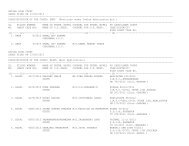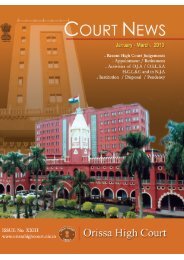ORIGINAL JURISDICTION - Orissa High Court
ORIGINAL JURISDICTION - Orissa High Court
ORIGINAL JURISDICTION - Orissa High Court
You also want an ePaper? Increase the reach of your titles
YUMPU automatically turns print PDFs into web optimized ePapers that Google loves.
114<br />
The plaintiffs who are opposite party nos.1 and 2 filed the suit for<br />
cancellation of a sale deed, declaration of title, confirmation of possession<br />
and permanent injunction with other reliefs. The present petitioner is<br />
defendant no.1 and the proforma opposite party no.3 is defendant no.2.<br />
However, the present petitioner who is only contesting the suit filed his<br />
written statement. In course of hearing of the suit, the evidence of both sides<br />
was closed and the suit was posted for argument. At that stage, defendant<br />
no.1 engaged a new counsel. After going through he pleadings and the<br />
SOUBHAGYA MOHANTY -V- H. MOHANTY [S.PANDA,J.]<br />
evidence adduced by the parties, the newly engaged counsel felt it essential<br />
that P.W.1 who was plaintiff no.1 be recalled for further cross-examination as<br />
questions on several material aspects had not been put to him during his<br />
cross-examination. The conducting counsel appearing for defendant no.1<br />
filed an application under Order 18, Rule 17 read with Section 151 of the<br />
Civil Procedure Code giving the particular material aspects and the possible<br />
questions to be put to P.W.1 for further cross-examination which could not<br />
be put to him earlier due to omission of the previous conducting counsel on<br />
the date to which the suit was posted for argument. The plaintiffs filed their<br />
objections to the said application stating therein that defendant no.1 was<br />
trying to fill up his lacuna as P.W.1 was earlier examined and crossexamined<br />
and also re-examined on recall.<br />
3. After considering the plea of the petitioner and the objection filed by the<br />
plaintiffs, the trial court rejected the said application on the ground that the<br />
suit is in its fag end of hearing and P.W.1 has been exhaustively crossexamined<br />
by the previously engaged Advocate. The newly engaged<br />
Advocate filed the application with sixteen material points to be asked in the<br />
further cross-examination as to possession, partition, state of health,<br />
suspension, construction of house respectively. If the defendant is allowed to<br />
recall P.W.1 and ask those questions, it will amount to patching up and<br />
covering the lacuna left out after strenuous cross-examination by the<br />
previously engaged Advocate. It will cause prejudice to the plaintiffs. Again<br />
de novo trial will begin, as the plaintiffs will also attempt to counter the<br />
adverse materials that may likely arise in the evidence.<br />
4. Learned counsel for the petitioner submitted that the trial court should<br />
have considered the merit of the application without being influenced by the<br />
stage of the suit. Since Order 18, Rule 17, CPC stipulates that at any stage a<br />
witness can be recalled and if the same is necessary, the court may at any<br />
stage of a suit recall any witness who has been examined and may (subject<br />
to the law of evidence for the time being in force) put such questions to him<br />
as the <strong>Court</strong> thinks fit. In support of his contention, he cited the decisions<br />
reported in AIR 1981 Punjab & Haryana 157 (Om Prakash v. Sarupa and<br />
others), AIR 1984 Delhi 439 (Surersh Kumar v. Baldev Raj), 2005 (Supp)



